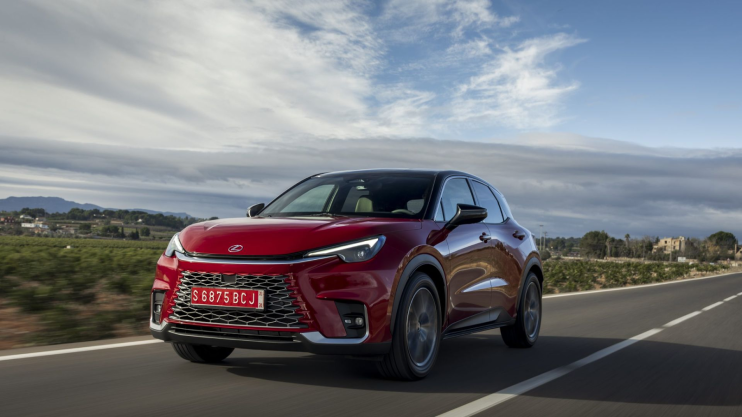Lexus LBX review: New hybrid SUV is downsized and upmarket

Who remembers the Aston Martin Cygnet? Launched in 2011, it was a Toyota iQ city car with ideas several miles above its station. My uncle actually bought one, which I drove for our Retro Road Test back in 2018. Apart from a white Cygnet that’s always parked in Belgravia, I can’t recall seeing another since.
The reason for mentioning Aston Martin’s ugly duckling is that, once again, I find myself accused of driving a ‘posh Toyota’. This time, the car in question is the Lexus LBX, a new hybrid SUV based on the Toyota Yaris Cross – and the smallest Lexus to date. Will it soar like a swan or sink without trace?
The Cygnet cost around £30,000 when new and the Lexus starts from £29,995 today. However, while the Aston Martin was nearly three times the price of a Toyota iQ, the gap between a Yaris Cross and the LBX is much narrower: around £5,000. The Lexus also offers more power and considerably more standard equipment. Let’s start with the spec…
A self-charging hybrid
There is only one engine available in the LBX: a 1.5-litre petrol hybrid of the ‘self-charging’ variety – i.e. it can’t be plugged in. The headline numbers are 136hp (up from 116hp in the Toyota), 0-62mph in 9.2 seconds, 61.4mpg and 104g/km. An automatic gearbox is standard, but you can choose front- or four-wheel drive.
There are no less than six trim levels available, plus the limited-run Original Edition with its glitzy copper paintwork. All cars come with LED headlights, dual-zone climate control, a 9.8-inch touchscreen, front and rear parking sensors and a reversing camera.
Mid-range Premium Plus specification, with heated front seats, wireless smartphone charging and tinted rear windows, is probably the sweet-spot. The fully-loaded Takumi (tested here) adds adaptive headlights, leather upholstery, multi-colour ambient interior lighting, an electric driver’s seat and a 13-speaker audio system.
Before we grab the keys, it’s also worth mentioning the Lexus warranty package, which covers you for up to 10 years or 100,000 miles if your LBX is serviced annually at a franchised dealer. Compared with the three years and 60,000 miles offered with the rival Audi Q2 – or three years and unlimited miles for the Mini Countryman – that already seems like a strong incentive for turning Japanese. Lexus has a peerless reputation for reliability and customer service as well.
Inside the Lexus LBX
This might be damning with faint praise, but the LBX is quite attractive for a compact SUV. Points of note include a fresh take on the Lexus ‘spindle’ grille, a full-width rear light bar and various two-tone paint options. A longer wheelbase and wider track than the Yaris Cross give it more presence on the road, too.
Inside, some hard plastics confirm you’ve bought the ‘budget’ Lexus, but all the touch-points, including the novel electric door buttons, look and feel suitably premium.
The digital display behind the steering wheel measures either 7.0 or 12.3 inches, depending on the trim level, while the crisp central touchscreen offers Apple CarPlay and Android Auto connectivity. By far the biggest annoyance is having to delve into several sub-menus to switch off the nagging speed limit notifications each time you restart the car. At least there are proper physical controls for the heating and air-con.
Boot space is reasonably practical at 402 litres (measured up to the parcel shelf), although this decreases to 317 litres if you opt for all-wheel drive. Rear-seat passengers aren’t so well accommodated, however, with restricted headroom and legroom for adults and taller children. If you’re looking for a family car, the larger Lexus NX would fit the bill better.
Steady as she goes
Lexus pitches the LBX as being sporty and fun to drive. In reality, it prefers not to be rushed; the three-cylinder engine and CVT gearbox get a bit uncouth if you treat it like a hot hatchback.
That said, the hybrid drivetrain offers ample performance for everyday use, combined with impressive efficiency. During a week-long test that included several motorway trips, I averaged close to 55mpg. Refinement is also very impressive if you take it steady, with the car regularly switching into silent electric mode when cruising.
Its ride is rather firm around town, then the LBX settles down with speed. It steers and handles with tidy precision and you will appreciate its compact dimensions when it comes to parking. The calming, cosseting feel of larger Lexus models is notable by its absence, though.
Lexus LBX: Verdict
The LBX falls short in a few areas, particularly rear-seat space and low-speed ride comfort. Nonetheless, its quality interior, efficient hybrid drivetrain and impressive tech – combined with likely reliability and that long warranty – should endear it to Lexus newbies, along with existing owners looking to downsize.
Of course, the most sensible option is to save money and buy a Toyota Yaris Cross. But premium cars aren’t chosen solely with level-headed logic, and you may be swayed by the LBX’s enhanced luxury and badge appeal.
Alternatively, after years as the punchline to an automotive joke, the Aston Martin Cygnet has become something of a cult classic and values are now on the rise. The cheapest example currently in the classifieds is £27,000.
So, Toyota, posh Toyota or very posh Toyota? The choice is yours.
Tim Pitt writes for Motoring Research
Lexus LBX Takumi FWD
PRICE: £38,245
POWER: 136hp
0-62MPH: 9.2sec
TOP SPEED: 106mph
FUEL ECONOMY: 61.4mpg
CO2 EMISSIONS: 104g/km